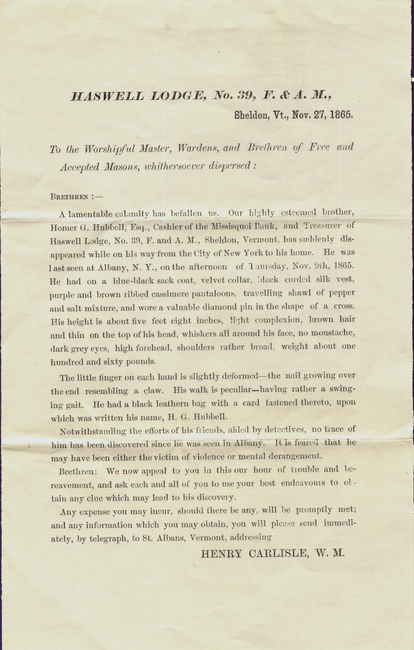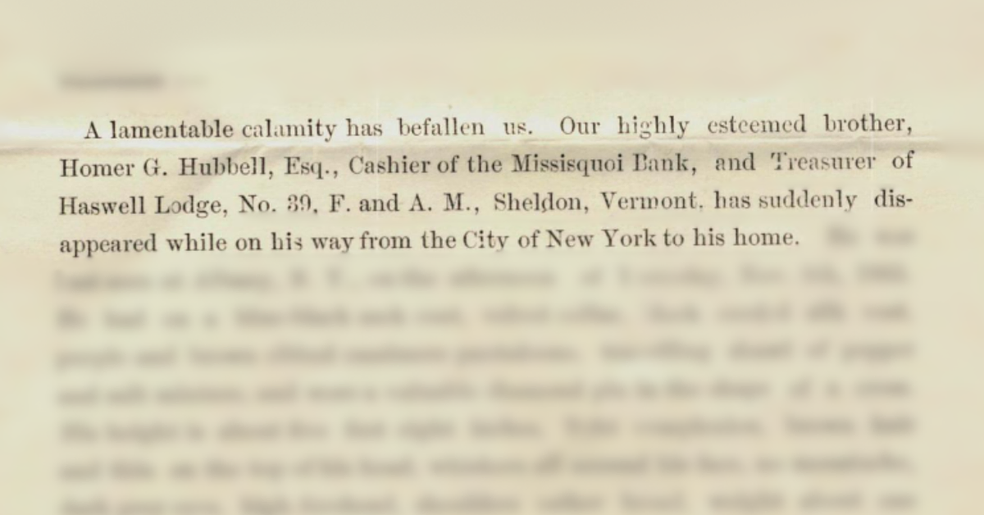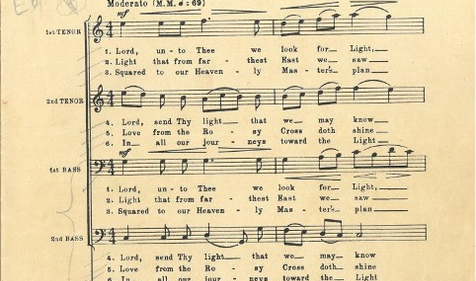The mystery of Freemason Homer G. Hubbell’s 1865 disappearance is told through an antique letter acquired by the Scottish Rite Masonic Museum & Library.
This article was originally published in the Fall 2023 issue of The Northern Light, written by Jeffrey Croteau, Director, Van Gorden-Williams Library and Archives.
The Scottish Rite Masonic Museum & Library recently acquired this circular letter which gives details about a Mason who went missing in November 1865. Henry Carlisle, the Worshipful Master of Haswell Lodge, No. 39 in Sheldon, Vermont, issued the circular informing readers about the disappearance of Homer G. Hubbell, who was Treasurer of the lodge and a cashier at the Missisquoi Bank in Sheldon.

A “Lamentable Calamity”
The letter describes Hubbell’s disappearance as a “lamentable calamity” and notes that Hubbell suddenly disappeared while on his way home to Sheldon from New York City. A description of Hubbell includes specific aspects of his appearance as well as noting that “his walk is peculiar, having a rather swinging gait.”
The text of the circular implies that much has been done to try to locate Hubbell already: “Notwithstanding the efforts of his friends, aided by detectives, no trace of him has been discovered since he was seen in Albany. It is feared that he may have been either the victim of violence or mental derangement.” Addressed to “the Worshipful Master, Wardens, and Brethren of Free and Accepted Masons, whithersoever dispersed,” this document was a desperate appeal to help locate Hubbell.
Spreading the News
The circular was meant to share the news of Hubbell’s disappearance, and it did. A couple of weeks after the circular was issued, on December 9, 1865, the Vermont Chronicle of Bellows Falls published the text of the circular verbatim under the headline “The Disappearance of Mr. Hubbell.” Other newspapers included short articles regarding when Hubbell was last seen. A notice in a Danville, Vermont, newspaper in December 1865 stated that a man in Chicago, who was a close friend of Hubbell’s, met Hubbell on the street and talked to him. After a month of his friends, fellow Masons, and family worrying about him, the truth of why Hubbell disappeared emerged.
The Truth Comes Out
In the January 12, 1866, edition of the Vermont Record, an article stated that Hubbell had embezzled $75,000 from the bank that had employed him. The same article refers to Hubbell as a “fast liver, his expenses exceeding those of almost any man in Franklin County.” Indeed, the 1866 Proceedings of the Grand Lodge of Vermont include a vignette about the entire story written by the author of the circular, Henry Carlisle. In it, Carlisle refers to “our (as we all supposed) Worthy Brother, Homer G. Hubbell” and mentions the circular pictured here, copies of which he says he sent to “most of the Lodges through the United States and Canada.” Carlisle ends the story by noting that “the sequel to Mr. Hubbell’s absence is a sorrowful tale. On Thursday, January 4, the President and Directors of the Bank came out publicly, charging Mr. Hubbell with being a defaulter of sixty thousand dollars or more.
Newspaper articles that appeared shortly after he was publicly charged by the bank referred to Hubbell as a “defaulting cashier.” By late January 1866, newspapers as far away as Pennsylvania and Washington, D.C., were running pieces about an auction of Hubbell’s personal effects. The list of Hubbell’s belongings at auction paints a picture of a person living far beyond his means. The list includes “an extraordinary amount of clothing and boots—such as twenty-five pairs of pants, twenty pairs of boots, but very little worn, fifteen vests, and many overcoats. In his safe, which was broken open, was discovered a $500 United States bond and a $400 promissory note. Over a wardrobe in his house was also discovered, covered with dust, $8,500 bills of the Missisquoi Bank, signed by the President and Cashier.” The list ends on a humorous note: “He had evidently provided against a ‘rainy day,’ for twenty-one umbrellas were among his effects.”
Unsurprisingly, among “Expulsions” in the 1867 Proceedings of the Grand Lodge of Vermont, Homer G. Hubbell, formerly of Haswell Lodge, No. 39, is listed.
Have questions? Drop us a line at [email protected] or give us a call at 781-457-4109.
For more stories on Masonic history, visit the Scottish Rite Masonic Museum & Library’s blog.
Related Stories
Discover additional Scottish Rite blogs and news on this topic.



